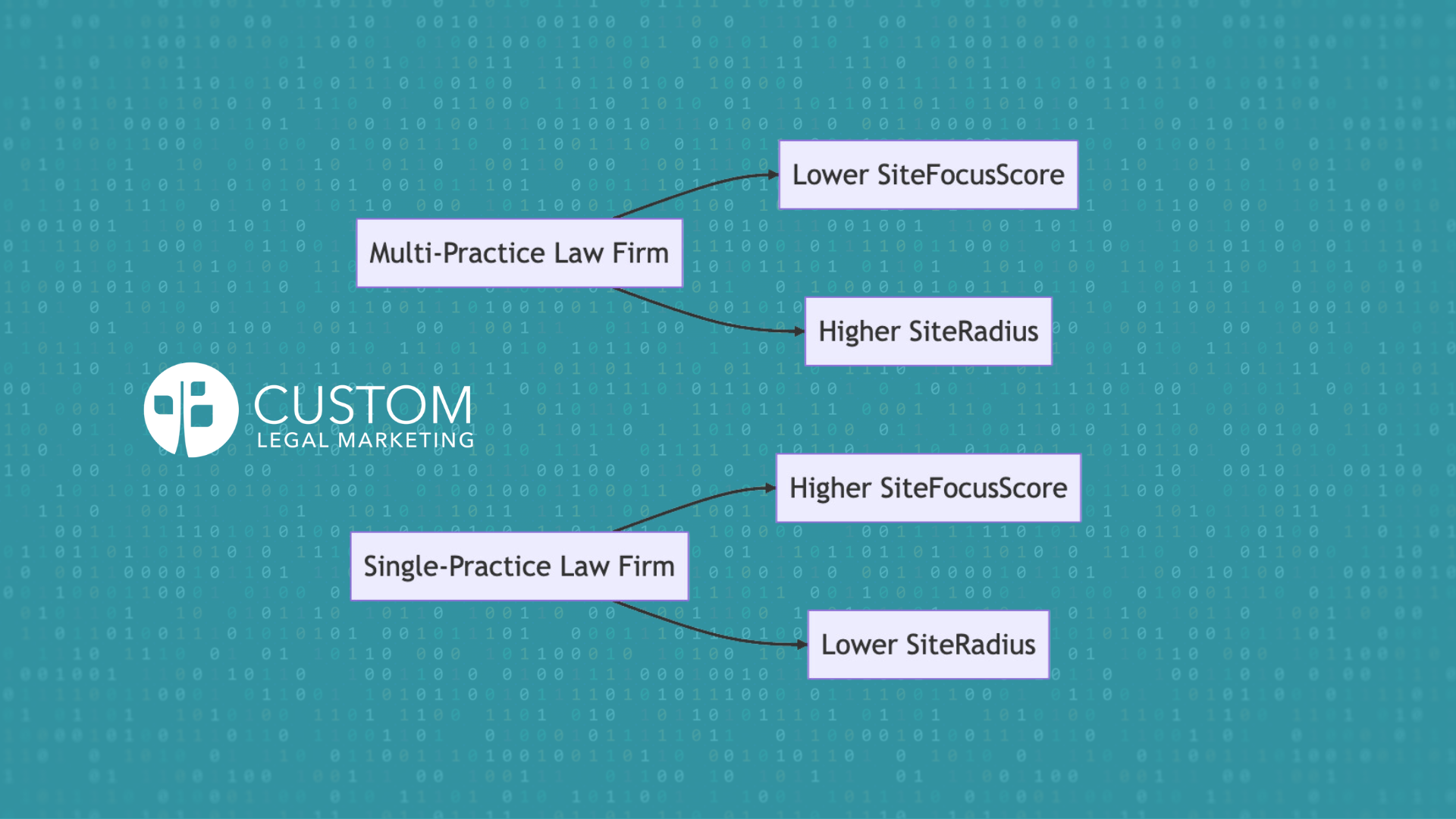If you haven't heard, there was a massive Google algorithm leak showing the inner workings of the Google Algorithm and revealing some of the search giant's closely guarded secrets. There is a lot to unpack! But we're focused on what we're learning about law firm SEO rankings and how we can use this leak to help your firm rise above the competition.
Two metrics were especially interesting—siteFocusScore and siteRadius— because they explain why large law firms (like AM Law 100 firms) often struggle against smaller, focused, local firms in spite of their inherent advantages such as global media and massive high authority link portfolios. Let's look at these metrics, review their significance and offer insights into how law firms like yours can leverage this knowledge to optimize your online presence.
Understanding SiteFocusScore and SiteRadius
What is SiteFocusScore?
SiteFocusScore is a metric that denotes how focused a website is on a specific topic or practice area. Essentially, it measures the degree of topical uniformity across a website. The higher the SiteFocusScore, the more concentrated the content is around a central theme, which Google perceives as a sign of authority in that particular area.
What is SiteRadius?
SiteRadius measures the deviation of individual page embeddings from the overall site embedding. In simpler terms, Google creates a topical identity for your website, and each page is evaluated based on how closely it aligns with this identity. A smaller SiteRadius indicates that the individual pages on the site are closely related to the main topical theme, reinforcing the site's authority in that niche.
The Impact on Law Firms
For law firms, knowing these metrics can be game-changers. With this revelation, it would appear that large, multi-practice firms have a lower SiteFocusScore in Google's algorithm due to the diverse range of legal services they offer. This can lead to a higher SiteRadius, indicating that their content is more dispersed across various topics. On the other hand, local firms focused on a single practice area tend to have a high SiteFocusScore and a low SiteRadius, positioning them as authoritative figures in their niche.
A large SiteRadius=Jack of all trades, master of none.
Why Multi-Practice Law Firms Struggle
Diluted Topical Authority
One of the primary reasons large, multi-practice law firms struggle is the dilution of topical authority. With a broad range of practice areas, from family law to corporate law, these firms are less likely to have a high SiteFocusScore. Google’s algorithm tends to favor sites that exhibit a strong, singular focus, as it interprets them as more authoritative and relevant in that specific area.
Increased SiteRadius
A diverse range of content leads to a higher SiteRadius, meaning that individual pages deviate more from the site's central topical identity. This deviation can confuse Google's algorithm, making it harder for the site to rank well for specific, high-value keywords. For example, a page on corporate law might not align well with the site's overall embedding if the firm also heavily features content serving clients seeking a car accident lawyer or domestic violence defense attorneys.
Local Relevance
Local law firms often have a significant advantage due to their focused content. A firm specializing solely in personal injury law in a specific geographic area is more likely to have a high SiteFocusScore and a low SiteRadius. This concentrated focus signals to Google that the firm is an authority in that particular field and region, thereby improving its local search rankings.
Resource Allocation
Large firms often allocate resources across various practice areas, leading to a fragmented marketing strategy. In contrast, smaller firms can dedicate all their marketing efforts to a single practice area, enhancing their online visibility and engagement. This focused approach allows them to create high-quality, relevant content that resonates with their target audience, further boosting their SiteFocusScore.
Strategies for Large Law Firms to Improve SiteFocusScore and Reduce SiteRadius
Content Silos
One effective law firm marketing strategy for large law firms is to create content silos. Content silos involve organizing content into tightly-knit clusters around specific practice areas. Each silo should have a dedicated landing page that links to related articles, case studies, web stories, and blog posts. This organization can help enhance the SiteFocusScore for each practice area, making it easier for Google to understand the site’s topical authority.
Internal Linking
Improving internal linking can also help reduce SiteRadius. By strategically linking related pages within the same practice area, firms can reinforce their topical clusters. Internal links should use relevant anchor text that aligns with the target keywords, further signaling topical relevance to Google.
Local SEO Tactics
Law firms should also invest in local SEO strategies. This includes optimizing Google My Business listings, acquiring local citations, and generating positive local reviews on a regular basis. By combining a focused content strategy with robust local SEO practices, large firms can improve their rankings in local search results.
Regular Content Audits
Performing regular content audits can help identify pages that deviate from the firm's primary practice areas. By either updating or removing these pages, firms can reduce their SiteRadius and enhance the overall coherence of their site. Content audits also provide an opportunity to identify gaps and create new, focused content that aligns with the firm's main practice areas.
What is SiteFocusScore, and why is it important for law firms?
SiteFocusScore measures how focused a website is on a specific topic or practice area. It is crucial for law firms because a higher SiteFocusScore indicates a strong, singular focus, which Google's algorithm interprets as a sign of authority in that particular area. This can lead to better search rankings and increased visibility.
How can multi-practice law firms improve their SiteFocusScore?
Multi-practice law firms can improve their SiteFocusScore by creating content silos, using subdomains or microsites for different practice areas, and improving internal linking. These strategies help organize content into tightly-knit clusters, enhancing the site’s topical authority.
What is SiteRadius, and how does it affect a law firm's SEO?
SiteRadius measures the deviation of individual page embeddings from the overall site embedding. A higher SiteRadius indicates that content is more dispersed across various topics, which can confuse Google's algorithm and make it harder to rank well for specific keywords. Reducing SiteRadius by focusing on cohesive, related content can improve a law firm's SEO performance.
By understanding and optimizing for SiteFocusScore and SiteRadius, law firms—whether large or small—can better navigate the complexities of Google’s algorithm, ultimately enhancing their online visibility and authority.

